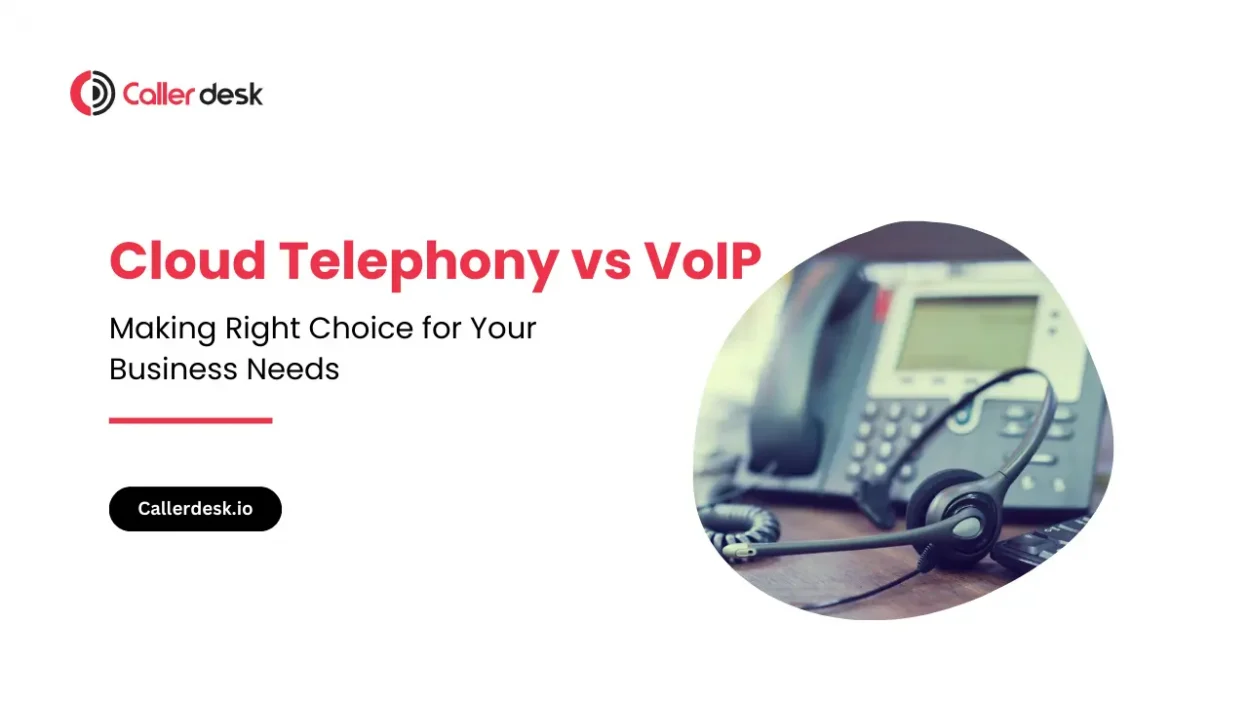Have you ever wondered which communication technology is best suited for your business: Cloud Telephony or VoIP?
With the rapid evolution of digital communication, choosing the right solution can be challenging yet crucial for operational success. This guide will explain the key differences between cloud telephony and VoIP, making it easier for you to decide which one suits your business best. Whether it’s the cost savings of a cloud business phone service or the advanced features of VoIP, we’ll help you understand which option fits your company’s unique communication needs.
Understanding Cloud Telephony
A cloud phone system, or cloud telephony, is an internet-based communication solution that enables businesses to make and receive calls through the cloud. This system integrates seamlessly with various devices, enabling users to access phone services from anywhere.
What Makes Cloud Telephony Stand Out?
- Scalability: Easily add or reduce lines and services to match your business needs without hardware changes.
- Integration with CRM: Seamlessly integrates with CRM systems to log customer interactions, enhancing sales and support efficiency.
- Real-Time Analytics: Provides instant access to call metrics and reports, supporting data-driven decisions and improved operations.
In India, cloud business phone services are favored for their cost-effectiveness and flexibility. They support high call volumes, offer reliable connectivity, multi-language support, and local numbers, enabling professional communication nationwide.
Understanding VoIP (Voice over Internet Protocol)
VoIP, or Voice over Internet Protocol, is a technology that allows you to make phone calls using the internet instead of traditional phone lines. Essentially, it converts your voice into digital signals that travel over the internet, making communication more efficient and cost-effective.
What Makes VoIP Service Stand Out?
- Low-Cost International Calling: VoIP services enable affordable international calls, making them ideal for businesses with global clients or remote teams.
- Compatibility with Various Devices: VoIP works across smartphones, tablets, and computers, ensuring employees can stay connected anywhere, boosting mobility and productivity.
- Scalability and Flexibility: VoIP systems can easily add or remove lines, making them perfect for growing businesses with changing communication needs.
- Advanced Features: VoIP includes features like voicemail to email, call forwarding, and video conferencing, enhancing communication and user experience.
In India, VoIP is gaining popularity among businesses due to its cost-efficiency and flexibility. As high-speed internet and cloud phone systems become more common, companies are switching to VoIP to reduce communication costs and ensure reliable connectivity, even in remote areas.
Key Differences between Cloud Telephony and VoIP
When considering the best communication solution for your business—whether it’s a cloud phone system or VoIP—understanding the differences in technology, setup, maintenance, and scalability is crucial.
1. Technology
- Cloud Telephony: Operates through the internet, using a cloud-based infrastructure managed by a third-party provider. It utilizes VoIP technology but offers additional services like virtual numbers and integrated applications.
- VoIP: Enables voice and multimedia communications over the internet. It can be hosted on-premises or through a VoIP service provider.
2. Setup and Maintenance
- Cloud Telephony: Quick deployment with minimal hardware requirements. Configuring user credentials and integrating with current systems are part of the setup process. Managed by the provider, reducing the burden of maintenance tasks such as updates and upgrades.
- VoIP: Requires more initial setup, including installing hardware (IP phones, PBX systems) and configuring network settings. It can be hosted either on-premises or by a VoIP service provider. Users manage hardware and software updates, and on-premises setups necessitate IT support for troubleshooting and maintenance.
3. Scalability
- Cloud Telephony: Highly scalable, allowing businesses to easily add or remove lines and features as needed. Ideal for businesses experiencing rapid growth or seasonal fluctuations in call volume.
- VoIP: Scalable based on network capacity and hardware limitations. Expansion may require additional hardware and network infrastructure investments.
4. Cost Comparison between Cloud Phone Service vs. VoIP
Initial Costs
- Cloud Business Phone Service: Minimal hardware costs, typically lower or no setup fees as the infrastructure is managed by the service provider.
- VoIP: Higher hardware investment, additional expenses for professional installation and setup.
Ongoing Costs
- Cloud Business Phone Service: Subscription-based with predictable costs, ideal for growing businesses.
- VoIP: Maintenance costs, periodic fees for software updates and licenses, potentially higher operational expenses due to the need for in-house IT support.
Benefits of Cloud Telephony and VoIP
Benefits of Cloud Telephony
1. Flexibility and Mobility
Cloud telephony allows employees to stay connected, no matter where they are. Whether your team is working from home, on the road, or in another country, they can access the phone system from any device with internet connectivity.
2. Integration with Business Tools
Cloud telephony seamlessly integrates with CRMs, helpdesks, and other business tools, streamlining workflows and improving efficiency. From tracking customer interactions to automating follow-ups, these integrations are a game-changer for businesses focused on customer experience.
3. Scalability for Growing Businesses
Unlike traditional systems, cloud telephony grows with your business. Adding new users or features is quick and easy, without the need for expensive hardware upgrades.
4. Advanced Features
Cloud telephony offers advanced features like call routing, IVR, analytics, and call recording, which help businesses improve customer service and make data-driven decisions.
Benefits of VoIP
1. Cost Savings
One of the biggest advantages of VoIP is its ability to cut costs. By routing calls over the internet, businesses save significantly on international and long-distance call charges. There’s also no need for separate phone lines or expensive hardware installations.
2. Easy to Use
VoIP systems are user-friendly and require minimal training to get started. Employees can quickly adapt to the system, ensuring a smooth transition for your business.
3. HD Voice Quality
VoIP offers superior call quality, provided you have a stable internet connection. Clear audio ensures better communication, which is especially critical for client interactions.
4. Wide Device Compatibility
VoIP works on multiple devices, including desktop phones, mobile phones, and even laptops. This allows employees to stay connected across various devices, making communication seamless.
5. Global Connectivity
VoIP enables businesses to connect with international clients and remote teams easily. With features like virtual phone numbers and global call routing, it simplifies cross-border communication.
Potential Drawbacks of Cloud Telephony and VoIP
Cloud Telephony
1. Internet Dependency
Cloud telephony needs a stable internet connection to function. If your internet is slow or unreliable, you could experience poor call quality, dropped calls, or delays.
Think About It: A client calls you to close a deal, but the call breaks up because of your internet. Frustrating, right?
2. Privacy and Security Risks
Since cloud telephony operates online, it’s vulnerable to cyber threats like hacking and data breaches. Without strong encryption and security measures, sensitive customer and business data could be at risk.
Simple Fix: Invest in top-notch cybersecurity tools to keep your data safe.
3. Adjustment Period
Switching from traditional phone systems to cloud telephony can feel overwhelming for some teams. Training employees on the new system might take time, temporarily slowing down operations.
Pro Tip: Offer simple training sessions to make the transition smoother.
VoIP (Voice over Internet Protocol)
1. Call Quality Depends on Internet Speed
VoIP is amazing—when your internet is solid. If your bandwidth is low or your network is congested, you’ll face call quality issues like delays or choppy audio.
Imagine This: You’re on an important call, and the other person sounds like a robot. Not great for business, right?
2. Regulatory Compliance Can Be Tricky
VoIP services need to comply with local telecom laws, which can vary widely. Plus, you must ensure secure data transmission and storage, especially if you handle customer data.
The Solution: Work with a VoIP provider that understands and handles compliance for you.
3. Emergency Call Limitations
Unlike traditional phone lines, VoIP might not provide accurate location details for emergency services. This can be a challenge if someone needs immediate assistance.
Workaround: Use a backup plan like a mobile connection for emergencies.
4. Hardware and Power Dependency
VoIP relies on devices like routers, modems, and phones to work. If there’s a power outage or your equipment malfunctions, your communication could be disrupted.
Pro Tip: Have a backup power source or secondary system to keep things running.
Factors to Consider When Choosing Between Cloud Telephony and VoIP
Choosing the right communication system for your business is a big decision. Both Cloud Telephony and VoIP offer unique advantages, but the best choice depends on your business’s specific needs, budget, and growth plans. Let’s break it down:
1. Business Size and Needs
- Cloud Telephony: If you’re running a small to medium-sized business or call center, cloud telephony is a perfect fit. It offers an all-in-one solution with features like call routing, IVR, and analytics without the need for heavy technical expertise.
- VoIP: Larger call centers that need extensive customization and integration with existing systems often find VoIP more suitable. It provides flexibility to tailor the system to specific operational needs, but may require IT support for setup and maintenance.
Pro Tip: Start with cloud telephony if you’re new to advanced phone systems. Switch to VoIP as your needs become more complex.
2. Cost and Budge
- Cloud Telephony: This option typically has lower upfront costs since it runs on a subscription-based model. You’ll enjoy predictable monthly expenses, making it easier to manage budgets.
- VoIP: While VoIP can reduce call costs (especially international calls), it requires a higher initial investment for hardware and setup. Additionally, you may face ongoing maintenance costs for upgrades and troubleshooting.
Pro Tip: For startups and businesses looking to minimize initial costs, cloud telephony is the smarter choice. Established enterprises with bigger budgets may prefer VoIP for its long-term cost efficiency.
3. Future Growth
- Cloud Telephony: Scalability is a major advantage of cloud telephony. Whether you’re adding new employees or expanding to new locations, cloud systems grow effortlessly with your business without requiring significant changes.
- VoIP: Scaling with VoIP requires careful planning and may involve additional hardware, licenses, or software upgrades, which can be time-consuming and costly.
Pro Tip: If you anticipate rapid growth or seasonal fluctuations in demand, cloud telephony is the more flexible and future-proof option.
4. Ease of Integration
- Cloud Telephony: Designed for modern businesses, cloud telephony easily integrates with tools like CRMs, helpdesks, and productivity platforms, enhancing workflows and customer interactions.
- VoIP: While VoIP can also integrate with business tools, it may require more technical configuration, making it less plug-and-play compared to cloud systems.
Pro Tip: If seamless integration is a priority, especially for customer-centric businesses, cloud telephony is the better choice.
Conclusion
Choosing the right communication system is vital for the success of your call center. We’ve compared cloud telephony and VoIP, noting that cloud telephony typically comes with lower initial costs and predictable ongoing expenses, while VoIP involves a higher initial investment but offers more control and customization. To make the best choice, consider your budget, scalability needs, maintenance capabilities, feature requirements, and reliability. Personally, I lean towards cloud telephony because of its scalability and minimal maintenance needs. However, it’s essential to explore both options to see what fits your business best.
For expert advice and personalized solutions, I recommend reaching out to Caller Desk. They can help you navigate this important decision and ensure you choose the right system for your needs.





